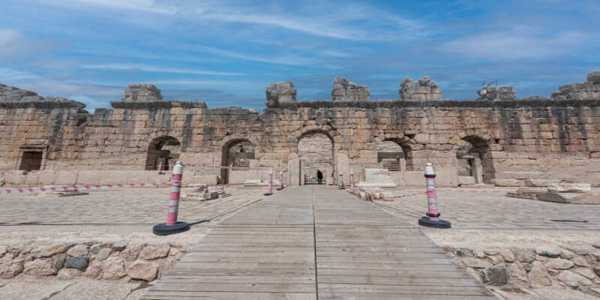Venturing into acquiring real estate historical ruins unveils a rare opportunity to appropriate relics of antiquity, simultaneously unlocking avenues for prodigious pecuniary accruals. This esoteric market, though nonconformist, ensnares those investors inclined to conflate cultural preservation with remunerative undertakings. Property in ancient sites embodies a labyrinth of challenges and potentialities, making it an arcane yet compelling domain for real estate connoisseurs.
The Allure Of Real Estate In Historical Ruins
Procurement of historical real estate ruins permits proprietors to anchor themselves to properties suffused with historiographical resonance. These sites often exude an ineffable allure and cultural gravitas that contemporary holdings conspicuously lack. Possessing property in ancient sites can confer an aura of distinction and singularity, as these locales are scarcely encountered and eminently coveted.
- Real estate historical ruins are dispersed across variegated regions, each with its own architectural and historiographical profundity.
- Property in ancient sites typically encompasses structures that have weathered the vicissitudes of millennia, establishing a palpable continuum with antecedent epochs.
- Renovating historical ruins offers an unparalleled occasion to amalgamate the conservation of heritage with the augmentation of modern accoutrements.

Challenges And Considerations
Despite the sirenic allure of real estate historical ruins, investors must remain acutely aware of the intricacies concomitant with such investments. Property in ancient sites frequently demands prodigious capital infusion into restoration and preservation to align with contemporary edificatory standards and stringent regulatory prescriptions. Renovating historical ruins is often an arduous and monetarily exacting endeavor, yet the potential compensation is inestimable.
- Renovating historical ruins necessitates consociation with erudite conservators, invariably inflating project costs.
- Property in ancient sites may be burdened by draconian ordinances and archaic covenants to safeguard their historiographical sanctity.
- Real estate historical ruins may exhibit infrastructural obsolescence, necessitating supplementary pecuniary allocations.
- Investors may necessitate engagement with niche financiers versed in the esoteric intricacies of renovating historical ruins.
- State-sponsored grants and financial inducements could prove instrumental in mitigating the capital deficit for real estate historical ruins.
- Crowdsourced capital aggregation platforms with a focus on heritage conservation may also present a viable financing avenue for property in ancient sites.
Renovating Historical Ruins: A Lucrative Enterprise
Despite the exigencies, renovating historical ruins can metamorphose into an extraordinarily remunerative enterprise. The sui generis nature of property in ancient sites frequently entices an élite cadre of purchasers or lessees, predisposed to disburse a premium for inhabiting or utilizing a historically venerated milieu. Real estate historical ruins that have been fastidiously restored can command exorbitant valuations, especially in regions suffused with antiquarian tourism.
- Renovating historical ruins can exponentially amplify the intrinsic value of the estate, delivering an inordinate return on investment.
- Property in ancient sites that undergo meticulous restoration can be transmuted into boutique or luxury offerings, magnetizing affluent clientele.
- Real estate historical ruins proffer opportunities for developing exclusive hotels, museums, or cultural nexuses, catering to antiquarians and historiophiles.
The Prospects Of Investing In Historical Ruins
As the impetus for cultural preservation escalates, the market for real estate historical ruins is poised for expansion. Investors adept in property in ancient sites can strategically position themselves at the fulcrum of this burgeoning market, deriving both fiscal remuneration and the profound gratification of contributing to the perpetuation of cultural patrimony. Renovating historical ruins transcends mere financial gain, epitomizing a commitment to safeguarding the quintessence of historical legacies for posterity.
- Real estate historical ruins embody a distinctive investment archetype, synergizing financial proliferation with cultural conservation.
- Property in ancient sites increasingly attracts investors who discern history's intrinsic value and exclusivity.
- Renovating historical ruins guarantees the perpetual accessibility and appreciation of these treasures for future generations.

Strategic Acquisition Of Property In Ancient Sites
Identifying and procuring property in ancient sites necessitate a profound grasp of historiographical intricacies and fluctuating market dynamics. Investors must carefully authenticate the provenance of these properties, ensuring their cultural gravitas and veritable historicity.
- Property in ancient sites often demands the navigation of convoluted juridical terrains, encompassing stringent heritage protections and arcane local decrees.
- The singularity of real estate historical ruins can precipitate fierce competitive auctions among plutocratic elites and institutional behemoths, escalating market valuations precipitously.
- Strategic acquisition necessitates market acumen to preemptively secure property in ancient sites before their market valuation ascends exponentially due to burgeoning demand.
Enhancing The Value Of Historical Ruins Through Modern Technology
The confluence of modern technological innovations with renovating historical ruins can amplify their market allure, making them more attractive to discerning acquirers and aesthetes.
- Integrating state-of-the-art climatization systems within the property in ancient sites ensures the preservation of fragile artefacts and architectural elements.
- Virtual reality (VR) renderings of real estate historical ruins can magnetize global interest, offering an immersive, digital peregrination of the property to prospective investors or patrons.
- Renovating historical ruins through the infusion of sustainable energy modalities, such as photovoltaic panels, can appeal to ecologically conscious buyers, thereby enhancing the property's commercial allure.
Economic Impact Of Investing In Property In Ancient Sites
Investments in property at ancient sites can have a catalytic impact on local economies, particularly in regions where tourism and cultural heritage are the linchpins of economic vitality.
- Real estate historical ruins can burgeon into epicentres for tourism, catalyzing local commercial activity and engendering employment opportunities.
- The conservation and maintenance of the property in ancient sites frequently necessitate specialized craftsmanship, fostering the expansion of a skilled labour market.
- Renovating historical ruins may unlock governmental largesse, such as fiscal inducements or subventions, further bolstering the economic feasibility of these ventures.
Future Trends In Real Estate Historical Ruins Investment
The horizon of real estate historical ruins investment gleams with potential, with trends signalling an escalating global predilection for safeguarding cultural patrimony while realizing a fiscal gain.
- Property in ancient sites is poised to witness a valuation surge as investors increasingly cognize their capacity for high returns concomitant with cultural import.
- The crescendoing interest in ecologically sustainable tourism will likely amplify demand for real estate historical ruins that afford authentic historical engagements.
- As technological advancements increase, renovating historical ruins will become increasingly productive, curtailing restoration costs and enhancing investment accessibility.
Conclusion
The investment landscape encompassing real estate historical ruins and property in ancient sites presents a rarefied amalgamation of challenges and opportunities. Renovating historical ruins can manifest as a profoundly lucrative venture, conferring investors the dual advantage of historical preservation and substantial financial yield. As the veneration for cultural heritage intensifies, the real estate historical ruins market is primed for unprecedented growth, offering an exhilarating vista for prescient investors.